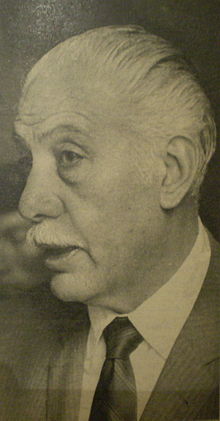Juan Lechín
| Juan Lechín Oquendo | |
|---|---|
 |
|
| Vice President of Bolivia | |
|
In office 6 August 1960 – 6 August 1964 |
|
| President | Víctor Paz Estenssoro |
| Preceded by | Ñuflo Chávez Ortiz |
| Succeeded by | René Barrientos Ortuño |
| Personal details | |
| Born |
14 May 1914 Coro Coro, Bolivia |
| Died | 27 August 2001 (aged 87) La Paz, Bolivia |
Juan Lechín Oquendo (18 May 1914 – 27 August 2001) was a labor-union leader and head of the Federation of Bolivian Mine Workers (FSTMB) from 1944 to 1987 and the Bolivian Workers' Union (COB) from 1952 to 1987. He also served as Vice President of Bolivia between 1960 and 1964.
Lechín was born to a Lebanese immigrant father and a Bolivian mother in Corocoro, a city in the Department of La Paz. He worked in the Catavi and Siglo XX tin mines, both of which were owned by the mining tycoon Simón Iturri Patiño. While working as a machinist in the mines, he was made aware of the desperate conditions of the vast majority of the highland workers. In the 1940s he became involved in the nascent labor movement and joined the Revolutionary Workers' Party (POR), a Trotskyist political party.
In 1944, Lechín led a congress of miners in Huanuni, Oruro, that led to the formation of the FSTMB. Lechín was elected the union's Executive Secretary. At this point, he became affiliated with the Revolutionary Nationalist Movement (MNR), though he maintained good relations with the Trotskyist POR.
Following the 1952 Bolivian National Revolution, Lechín was chosen as Minister of Mines and Petroleum. He also led the founding congress of the Central Obrera Boliviana (COB), an umbrella federation of labor unions, and was elected its Executive Secretary. Since he had played a vital role in the Revolution, and had advocated the permanent extension of weapons to the workers' militias to guarantee regime stability against the possibility of an oligarchic/military backlash, he became extremely popular with the poorer sectors of society. Indeed, he was the most charismatic and popular MNR leader other than Paz Estenssoro. In addition, he was of far more radical political persuasion (Marxist-inspired) than the rest of the government leadership. This inevitably led to growing intra-party tensions and disagreements over labor issues and personal ambitions.
...
Wikipedia
